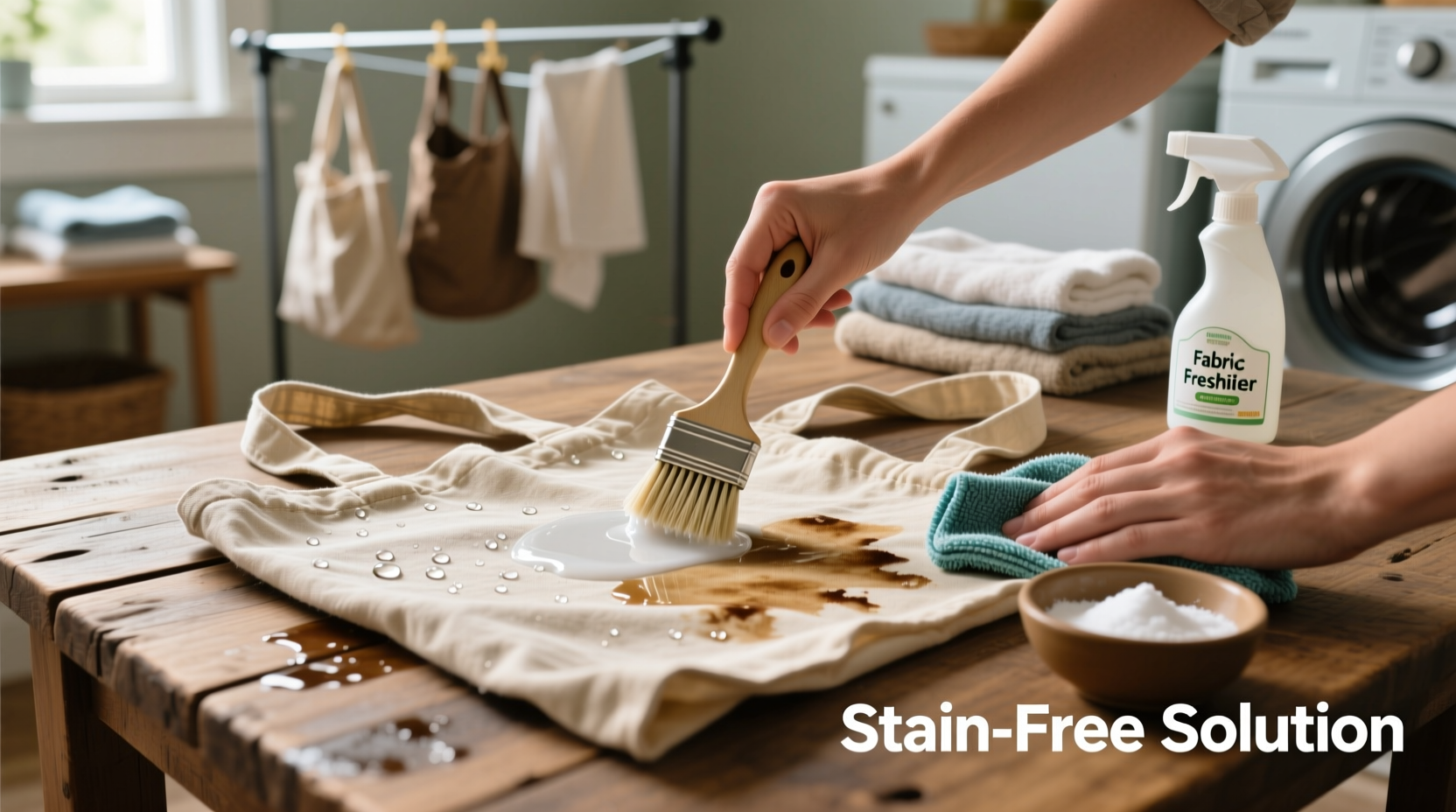Canvas tote bags have become staples in sustainable fashion—lightweight, durable, and eco-friendly. Whether used for groceries, work, or weekend outings, they endure daily wear and exposure to spills, dirt, and sweat. Over time, this can lead to stubborn stains and dulling fabric. The good news is that with the right cleaning techniques and preventive habits, your canvas tote can stay fresh, vibrant, and functional for years. This guide covers proven methods to clean and protect your tote, backed by textile care principles and real-world use.
Understanding Canvas Fabric and Its Vulnerabilities

Canvas is typically made from tightly woven cotton or cotton-blend fibers, offering strength and breathability. However, its natural fiber composition makes it absorbent—prone to soaking up liquids, oils, and odors if not treated promptly. Unlike synthetic materials, untreated canvas can develop mildew, discoloration, or permanent staining when exposed to moisture or organic matter like food residue.
The key to maintaining a clean canvas tote lies in understanding two factors: the type of canvas (waxed vs. raw) and the nature of the stain. Waxed canvas has a protective coating that resists water and stains but requires different care than untreated cotton canvas. Most everyday totes are made from raw or dyed cotton canvas, which responds well to gentle washing but can shrink or fade if mishandled.
“Canvas is resilient, but it’s not invincible. Immediate attention to spills and consistent maintenance prevent irreversible damage.” — Lena Ruiz, Textile Conservation Specialist
Step-by-Step Guide to Deep Cleaning Your Canvas Tote
For totes showing visible grime, odor, or set-in stains, a thorough cleaning restores both appearance and hygiene. Follow this timeline-based method for best results:
- Empty and Inspect (5 minutes): Remove all contents. Check pockets, seams, and corners for debris. Note any stains or areas of discoloration.
- Dry Brush (3 minutes): Use a soft-bristle brush (like an old toothbrush) to loosen surface dust and dried dirt. Focus on textured areas and stitching.
- Spot Treat Stains (10–15 minutes): Apply a small amount of mild detergent or stain remover directly to stained zones. Gently scrub in circular motions. For oil-based stains, use a dab of dish soap; for organic stains (coffee, juice), a paste of baking soda and water works well.
- Hand Wash (20 minutes): Fill a basin with lukewarm water and a capful of gentle laundry detergent (preferably one for delicates). Submerge the tote and agitate gently for 5–7 minutes. Avoid twisting or wringing.
- Rinse Thoroughly (5 minutes): Rinse under cool running water until no suds remain. Residual soap attracts dirt and weakens fibers over time.
- Dry Flat (6–24 hours): Lay the tote flat on a clean towel in a shaded, well-ventilated area. Reshape while damp to maintain structure. Never use a dryer—heat causes shrinkage and warping.
Do’s and Don’ts: Maintaining Long-Term Cleanliness
To preserve your tote between deep cleans, follow these essential practices. A few simple habits drastically reduce the need for intensive washing and help prevent permanent stains.
| Do | Don't |
|---|---|
| Wipe down after heavy use with a damp cloth | Machine wash unless label explicitly allows it |
| Use a fabric protector spray for spill resistance | Soak for extended periods—this weakens fibers |
| Store in a breathable cotton bag when not in use | Leave wet items or damp produce inside |
| Rotate multiple totes to reduce wear | Use bleach or harsh solvents—even diluted ones |
| Vacuum lightly with brush attachment monthly | Hang by straps long-term; this stretches the material |
Real Example: Reviving a Coffee-Stained Commuter Tote
Sarah, a graphic designer in Portland, relied on her navy canvas tote for her daily commute. After months of carrying her thermos, a recurring coffee leak left a brown ring near the base. Initially, she ignored it, assuming it was permanent. After noticing a faint musty smell, she decided to act.
She followed the spot-treatment method using a mix of hydrogen peroxide (3%) and liquid castile soap. She applied the solution with a microfiber cloth, blotted gently, then rinsed with cold water. After air-drying overnight, the stain had faded by 90%, and the odor disappeared. She now wipes the interior weekly and uses a reusable liner for drinks. Her tote, over two years old, still looks nearly new.
This case illustrates how timely intervention and proper technique reverse common wear issues without damaging the fabric.
Preventive Care Checklist
Integrate these actions into your routine to keep your canvas tote consistently clean and stain-resistant:
- ✅ Wipe interior and exterior with a damp cloth weekly
- ✅ Treat spills within 30 minutes
- ✅ Use removable liners for groceries or messy items
- ✅ Apply a fabric guard spray every 6–8 weeks
- ✅ Store in a dry, ventilated space away from sunlight
- ✅ Rotate between at least two totes to reduce strain
- ✅ Inspect monthly for loose threads or early mold spots
Frequently Asked Questions
Can I machine wash my canvas tote?
Only if the care label specifies it. Even then, use a gentle cycle with cold water and place the tote in a pillowcase to protect it. Hand washing is always safer and preserves shape and texture longer.
How do I remove mildew smell from a canvas bag?
Mix 1/2 cup white vinegar with 2 cups of water. Dampen a cloth with the solution and wipe the affected area. Let it sit for 10 minutes, then rinse with a clean, damp cloth and air dry completely. Vinegar neutralizes odor-causing bacteria without harming cotton fibers.
Is it safe to iron a canvas tote?
Yes, but only on low heat and with a pressing cloth between the iron and fabric. High temperatures can scorch cotton or melt synthetic blends. Iron only when the tote is slightly damp to ease wrinkles.
Conclusion: Make Maintenance Effortless and Effective
Cleaning a canvas tote doesn’t require special tools or expensive products—just consistency and the right approach. By addressing stains early, washing mindfully, and adopting simple preventive habits, you extend the life and beauty of a bag designed for sustainability. Think of your tote as a long-term companion, not a disposable item. With minimal effort, it can remain a reliable, stylish part of your daily routine for years.









 浙公网安备
33010002000092号
浙公网安备
33010002000092号 浙B2-20120091-4
浙B2-20120091-4
Comments
No comments yet. Why don't you start the discussion?